Last Sunday, our Oklahoma Orchid Society had its annual potluck, raffle, greenhouse tour and open house at the house of a couple of members. This was the first meeting where Christie has come along and gotten to meet some of my new orchid friends. We got to eat some good food, enjoy a greenhouse tour and we even came away with the door prize, a gigantic blooming
Phalaenopsis!
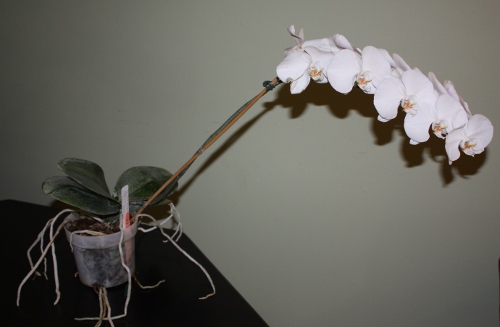 |
| Phalaenopsis door prize |
The greenhouse is a really nice size - probably 15 feet by 30 feet, as a guess. About 2/3 of the space is occupied by orchids and the other 1/3 is empty for now. As with any collector, I imagine that vacant space shrinks on a regular basis. The first plants you see when you come in are the Vandas, which Lowell, the owner, grows hanging without any substrate or pots. They seem to be doing really well for him.
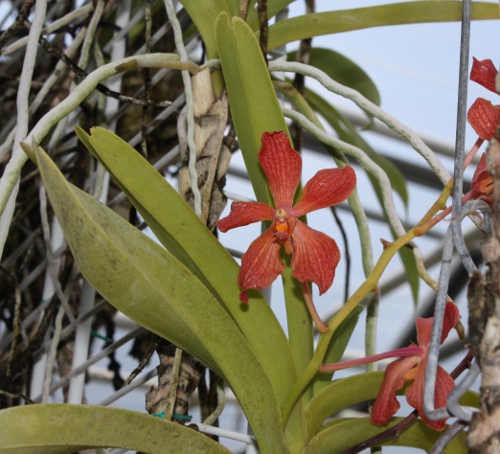 |
| Coppery-red Vanda |
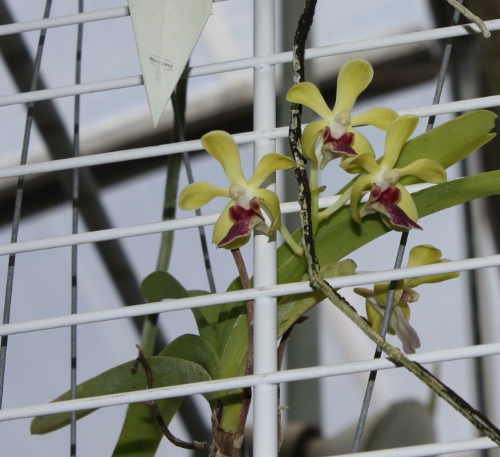 |
| Another Vanda in bloom |
Lowell has a lot of
Dendrobiums in his collection. Two really neat ones were in bloom, the species
Dendrobium antennatum, and a hybrid which has
Den. antennatum as one of it's parents. It was surprising how close the hybrid looked like the parent species, in this case. I couldn't see any differences in the flowers themselves.
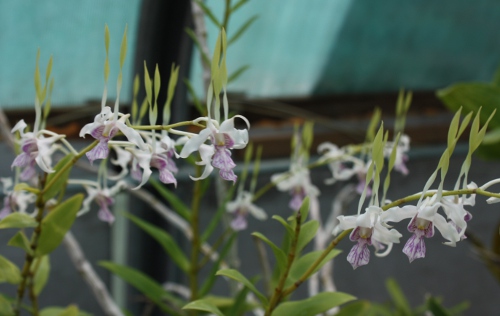 |
| Dendrobium antennatum |
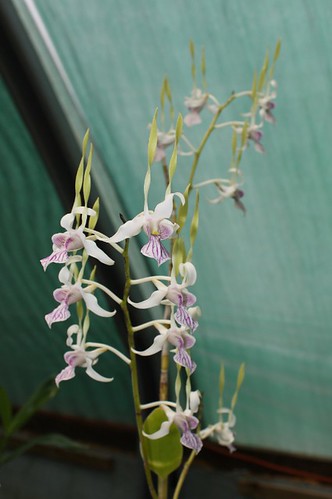 |
| Dendrobium hybrid |
Another
Dendrobium that was in bloom is
Den. bifalce, with a weird little flower coming out of the top of the characteristic
Dendrobium canes.
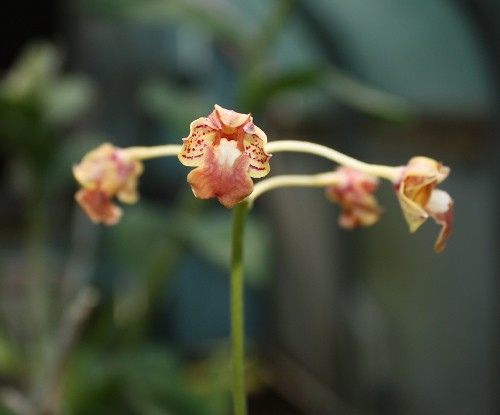 |
| Dendrobium bifalce |
The most unusual
Dendrobium in the collection is a very large and old plant which has grown from the basket to form a sphere. Apparently it just finished flowering, so we didn't get to see the flowers. But the plant,
Dendrobium anceps, is really cool. Lowell is justifiably proud of this one.
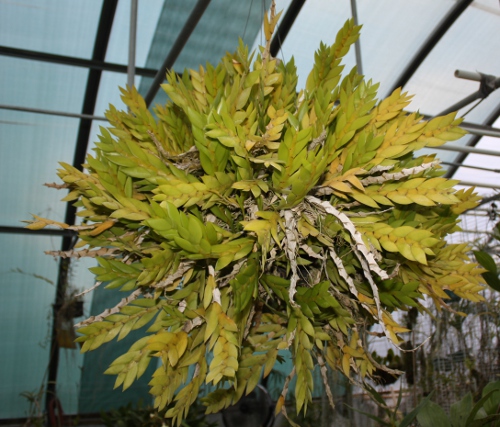 |
| Very nice Dendrobium anceps |
There are probably 5 or 6 different pots of
Vanilla planifolia growing in the greenhouse and the plant is climbing up the supports and running all over the place. This is the plant that produces
the vanilla flavoring used in cooking, which is an extract from the beans that form after a flower is pollinated. Lowell was kind enough to give me a piece about a foot long, so I have it in some soil and am trying to root it now. Lowell grows his in regular potting soil, not an orchid mix. He said his
Vanilla orchids flower regular, but he has yet to get one to pollinate.
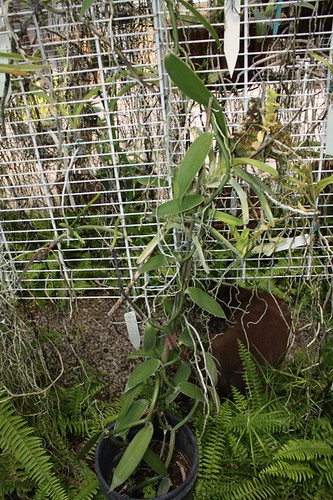 |
| Vanilla planifolia |
Lowell grows most of his
Bulbophyllums in coconut fiber baskets now. He said it contains them well and they seem to like it. One exception was this little
Bulbophyllum which was mounted and in bloom.
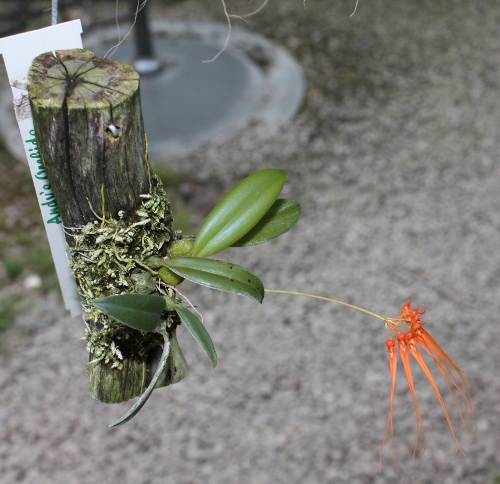 |
| Bulbophyllum species - probably tingabarinum |
There are also quite a few slipper orchids,
Paphiopedilums and some other genera I am not familiar with (not
Phragmipediums). I have to admit that the patterned leaves of these orchids are enticing to me - more so than the big, odd flowers.
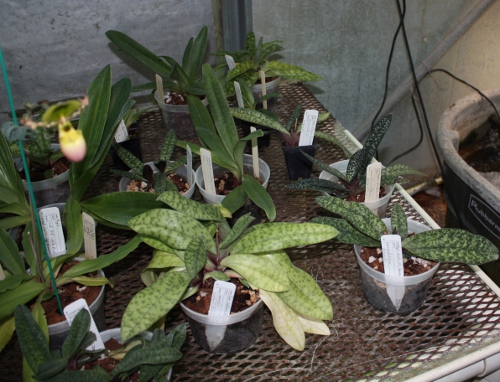 |
| Paphiopedilums and other slipper orchids |
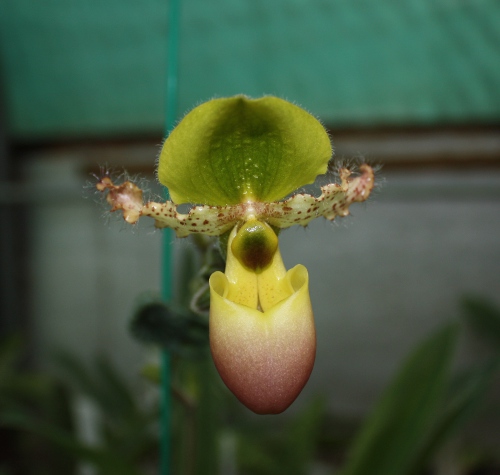 |
| Hybrid slipper orchid |
Some tree frogs (
Hyla versicolor) have taken up residence in the greenhouse and one was perched out on an orchid leaf for easy photographing.
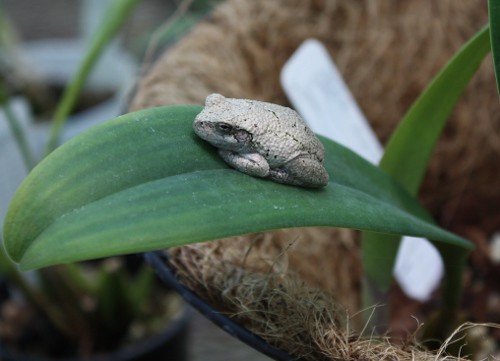 |
| Tree frog (Hyla versicolor) living in the greenhouse |
Next are the two largest plants in the collection (not counting the Vanilla orchid):
Sobralia and
Grammatophyllum. The tall
Sobralia decora was about 4 feet tall with beautiful stems. I really liked this plant and would be happy to grow it without any blooms. Apparently the blooms are very short lived, though, as expected, a mature plant does produce a plethora of them when it is in flower.
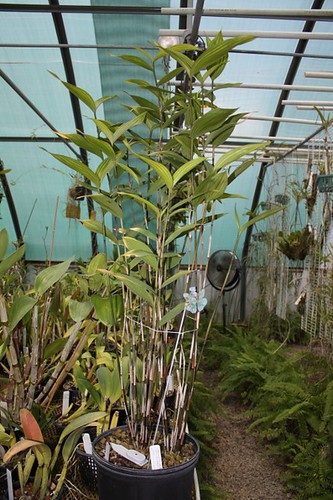 |
| Sobralia decora |
The genus
Grammatophyllum is referred to as the "Giant Orchid." It has a very tall, long-lived bloom spike. Lowell's
Grammatophyllum plant is not all that big, but the bloom spike was a good 4 feet tall. We saw a huge
Grammatophyllum at the
Foster Botanic Gardens in Hawaii a couple of years ago.
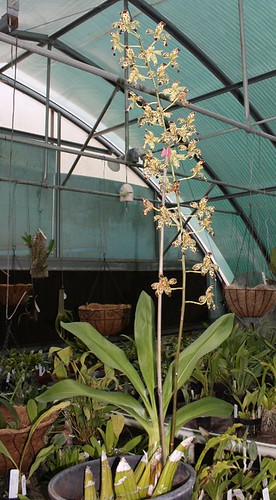 |
| Grammatophyllum in bloom |
I think the one plant I came away from the tour thinking I had to find is
Maxillaria lankesteri. This is a weird one that in many ways doesn't look like an orchid. Maybe that's why I like it. It's a fringe orchid. The flowers, from what I've seen online, are unmistakably that of a
Maxillaria, but the stems are wandering and woody looking - not like other
Maxillarias I know. Looking around online a bit I see that there is another species with similar woody-stems,
Maxillaria microphyton. I'll be looking for these plants.
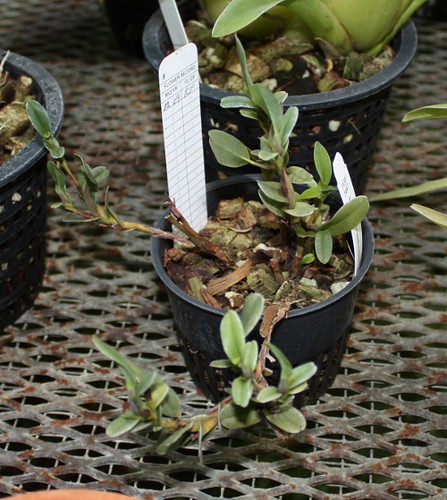 |
| Maxillaria lankesteri |
Another oddity in the collection is a
Habenaria which has really neat foliage and interesting looking buds. Apparently the flowers are very colorful. The buds look more like seed heads of a spent flower.
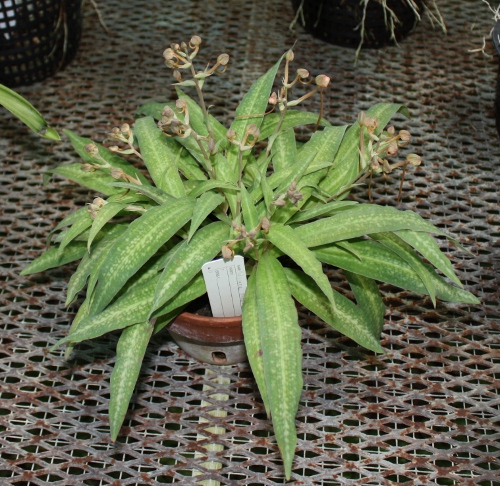 |
| Habenaria rhodocheila |
Lowell brought his beautiful, large
Dendrochilum to the last OOS meeting when it was in bloom. It had finished by the time of the greenhouse tour, so I just have a picture of the plant with spent blooms. But it's still a beautiful plant.
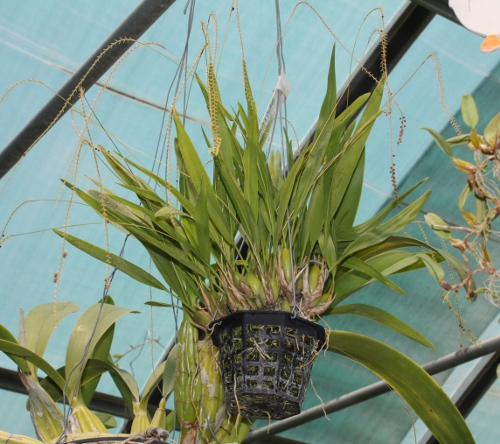 |
| Dendrochilum just finished blooming |
There are a number of different jewel orchids which look similar. Lowell is growing the common
Ludisia discolor, as well as something that looks nearly the same, but is from an entirely different genus. (Sorry, I didn't write down the name.)
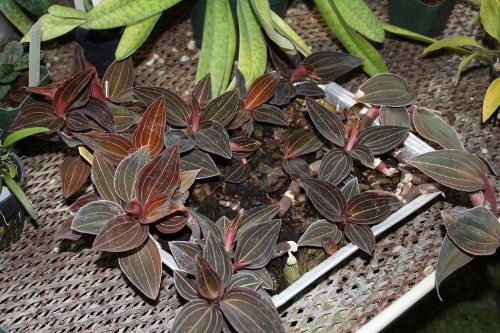 |
| Ludisia discolor |
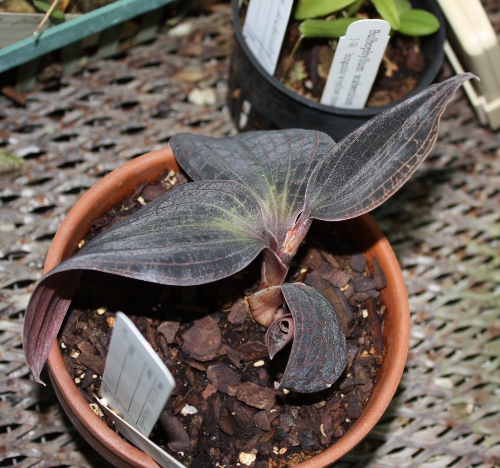 |
| Jewel orchid that looks like Ludisia discolor, but is something different |
Well, that's your virtual tour. I hope you enjoyed it as much as I did the live tour.



















That looks like a great tour! I had a Gramatophyllum for a while... I was so upset when it ended up dying on me. I think I rotted it. ::sigh:: I just saw that cane orchid (Sobralia? I'm too lazy to scroll up and see the actual name) blooming for the first time ever and was quite surprised to see that it's a nice flower. Bah now this post has made me want to go to an orchid greenhouse!
ReplyDeleteAs soon as I get a moment your getting some cuttings of a new maxillaria variablis I just got so dont get that one in your maxillaria hunt. I also have a new bulbophyllum with some unruly leads that I might just include, make some room in the greenhouse. HA!
ReplyDeleteWhat a wonderful tour! I didn't realize that about the vanilla orchid either. I will have to check this blog entry again.....so much info. Glad you all were able to experience this.
ReplyDelete